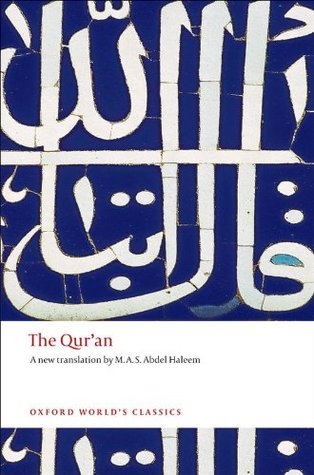More on this book
Community
Kindle Notes & Highlights
It is worth noting that the Qur’an has itself recorded all claims and attacks made against it and against the Prophet in his lifetime, but for many of Muhammad’s contemporaries the fact that the first word of the Qur’an was an imperative addressed to the Prophet (‘Read’) linguistically made the authorship of the text outside Muhammad. Indeed, this mode is maintained throughout the Qur’an: it talks to the Prophet or talks about him; never does the Prophet pass comment or speak for himself.
Modern interpreters take the view that the cultural context is different now and that a woman can be as well educated as a man, or even better. Therefore they confine this verse to its cultural context and allow a woman now to give witness alone, just as she is allowed to be a judge on her own.
walad in classical (Qur’anic) Arabic means the non-gender-specific ‘child’ or ‘children’, while in modern Arabic it can only mean ‘boy’ or ‘son’.
6As for those who disbelieve, it makes no difference whether you warn them or not: they will not believe.
42Do not mix truth with falsehood, or hide the truth when you know it.
‘We belong to God and to Him we shall return.’
195Spend in God’s cause: do not contribute to your destruction with your own hands,c but do good, for God loves those who do good.
219They ask you [Prophet] about intoxicants and gambling: say, ‘There is great sin in both, and some benefit for people: the sin is greater than the benefit.’
Most of the classical commentators take the view that Abraham must have had to cut up the birds first if they were really to rise from the dead, rendering this phrase ‘then place them separately on hilltops’. However, Abu Muslim thought the important part of the image was that it is as easy for souls to come back to the body as for the birds to come back to Abraham (Razi). Cf. ‘To Him you shall return’,
The food of the People of the Book is lawful for you as your food is lawful for them.
38Cut off the hands of thieves, whether they are man or woman, as punishment for what they have done—a deterrent from God:
if anyone forgoes this out of charity, it will serve as atonement for his bad deeds.
89God does not take you [to task] for what is thoughtless in your oaths,b only for your binding oaths:
We do not burden any soul with more than it can bear—
do not disgrace me with my guests.
Some commentators interpret this to refer to the daughters of his people, rather than the prophet’s own daughters.
11Yet man prays for harm, just as he prays for good: man is ever hasty.
31Do not kill your children for fear of povertya— We shall provide for them and for you— killing them is a great sin.
Many translators say ‘a son’ here, not realizing that walad in classical Arabic means ‘child’ or ‘children’. The discussion here is about the pagans of Mecca, who said that the angels were daughters of God.
16We did not create the heavens and the earth and everything between them playfully. 17If We had wished for a pastime, We could have found it within Us—if We had wished for any such thing. 18No! We hurl the truth against falsehood, and truth obliterates it—see how falsehood vanishes away!
224only those who are lost in error follow the poets.a 225Do you not see how they rove aimlessly in every valley; 226how they say what they do not do?b
80You cannot make the dead hear, you cannot make the deaf listen to your call when they turn their backs and leave,


